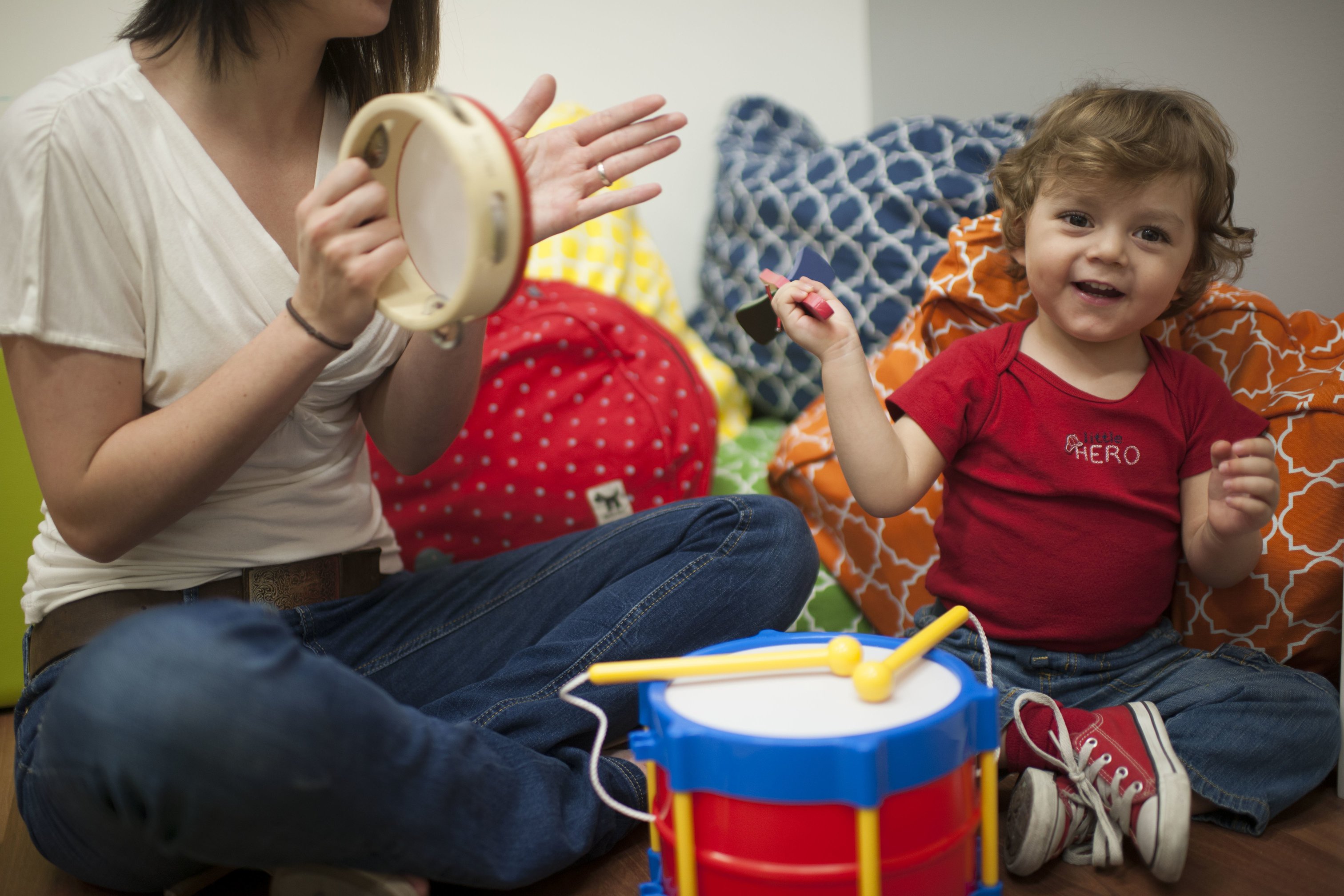“Music gives soul to the universe, wings to the mind, flight to the imagination, and life to everything.” – Plato
Key Points:
- Early exposure to music in a child’s first three years fosters speech, cognition, coordination, and social skills.
- Music enhances bonding, reduces distress, teaches social skills, encourages creativity, aids language development, and fosters musical skills, making it a fun and vital tool for early childhood development.
Listening to music lights up multiple areas of the brain as sound is processed, and all this happens in a matter of seconds. Research has revealed that playing music takes the brain a step further, stimulating a full-body workout for the brain. Now, teaching babies or toddlers to formally play instruments is not developmentally appropriate, but that doesn’t mean that they can not enjoy the benefits of music. On the contrary, listening to people sing, play with everyday objects or toys to create sounds, and sing and dance with caregivers are wonderful for your little one’s brain development.
During the first three years of your child’s life, neural connections form at their fastest rates. Exposure to music in early childhood fosters and helps develop many skills including speech development, cognition, coordination, emotional development, and even social skills.
What are the benefits of music?
Below are some of the ways of how music benefits your child’s rapid development and growth.
Music promotes bonding
Your baby loves your voice the best, therefore singing to your infant is a great way to develop a secure attachment through serve-and-return interactions. Incorporate your little one’s coos, gurgles, and babbles into a song and have back and forth interactions together. If your child is older, continue singing and incorporate playing a toy instrument or even pots and pans together by taking turns.
Music reduces distress
Singing to your baby instead of speaking delays distress. Researchers believe that using infant-directed singing is beneficial because of the predictable beat, metrical organization, and tempo that helps promote entertainment, predictive listening, and expectations for subsequent events. What’s more, rhythm found in singing and music affects vestibular stimulation, and when both singing and rocking are done together, they work as potent emotional regulators.
Music teaches social skills
Playing with homemade or toy instruments requires your little one to develop listening and turn-taking skills to create a harmonious and pleasing sound. With the help of caring caregivers, making music helps build the foundation for the development of executive function skills.
Music allows for artistic expression and creativity
Playing with musical items helps your little one foster creativity, express emotions freely, and develop their senses while discovering new ways to make sounds.
Music helps babies feel secure
Another benefit of music is that by using repetitive and specific songs during your baby’s routine helps them identify what comes next, making their day predictable and, therefore, stress-free.
Music helps develop language
Singing lights up the language areas of the brain as one identifies the words spoken. In addition, thanks to a song’s repetitive design, listening to words over and over reinforces the acquisition of new vocabulary.
Musical environments stimulate musical skills
When babies and toddlers are exposed to music during early development, they develop skills such as singing on pitch or dancing to a rhythm early on.
Music is play
Listening to music, dancing, and singing should not be a chore, it should be a free and fun way to develop skills such as language, motor skills, and coordination. During these early years of development, musical skills are just blooming. This period of growth is a prime time to explore your child’s natural musical spontaneity while encouraging their natural inclinations to sing, move, and play with sound.
What can you do at home?
- Dance with your baby while singing and link specific words to different movements to develop language, rhythm, and balance. Carry your baby and move around the room to a beat, or dance in front of a mirror with your little one to teach self-awareness, spend time together, and encourage musical skills.
- Teach your little one to use their body as a musical instrument by clapping and stomping to a beat, or use everyday objects to create sounds and learn about cause and effect. Note: For babies, gently tap on their backs to the music providing gentle touch and teaching them concepts of beat, rhythm, and even tempo.
- Teach your little one songs that include doing particular actions and show them how to dance along. Moving according to the song will teach them coordination, body awareness, and rhythm.
- Play stop-and-go games with your toddler. Play some music and dance around, but when the music stops, freeze! When the music starts again, they will be free to move around again. This is great for fostering executive function skills.
- Sing to your little one during bath time, bedtime, or during any other activity to have a soothing experience and, at the same time, emphasize predictability.
- Make music together. Use Kinedu to stimulate your baby’s musical abilities. Do the following activity with your child and be sure to visit the catalog section of the app to find more activities that promote musical development.
You can try to practice these activities with your child and see what they enjoy the most. Remember music is a good way to teach, encourage development, and stimulate senses in a fun way. What are you waiting for to enjoy all the benefits of music with your little one?








